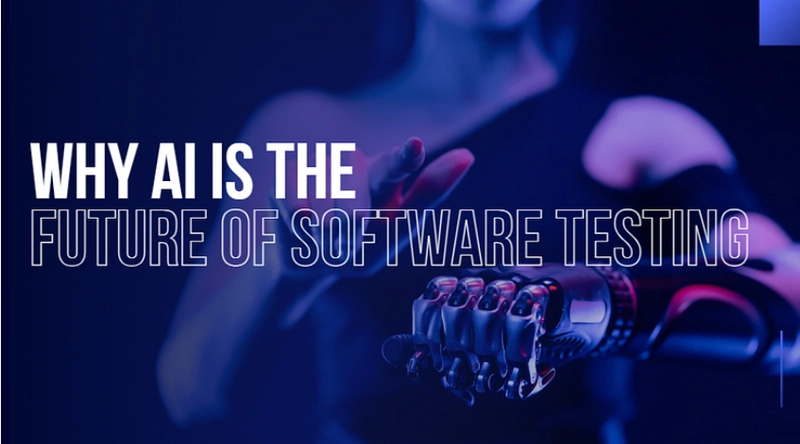In the fast-paced world of software development, ensuring high-quality products is no longer just an option — it’s a necessity. As software systems grow more complex, traditional testing methods struggle to keep up with the demand for speed, accuracy, and scalability. Enter Artificial Intelligence (AI) in software testing, a game-changing innovation that’s revolutionizing how quality assurance (QA) teams operate. From generative AI in software testing to sophisticated AI testing tools, the future of QA lies in the intelligent capabilities of these technologies.
The Role of AI in Software Testing
Artificial Intelligence has revolutionized software testing by automating routine tasks, improving test precision, and identifying potential defects before they occur. Rather than replacing human testers, AI enhances their abilities by allowing them to concentrate on more valuable tasks. With AI-powered tools, QA teams are able to optimize workflows, reduce mistakes, and accelerate release times without sacrificing quality.
Generative AI in software testing takes it a step further by not only automating tasks but also generating test scripts, crafting realistic test data, and recognizing intricate patterns that traditional tools may overlook. These AI systems are designed to learn from past testing cycles, adjust to evolving requirements, and progressively refine testing outcomes.
How to Use AI in Software Testing
Leveraging AI in software testing involves integrating intelligent tools and frameworks into existing QA processes. Some of the key areas where AI can make a significant impact include:
- Test Automation: AI can automate regression, performance, and functional testing, freeing up testers to focus on exploratory and creative tasks.
- Defect Prediction: Machine learning algorithms analyze historical data to predict where bugs are likely to occur.
- Intelligent Test Case Generation: AI tools can create optimized test cases, reducing redundancy and improving coverage.
- Self-Healing Scripts: AI-powered tools can automatically detect and fix broken test scripts, minimizing manual intervention.
- Performance Monitoring: AI continuously monitors software behavior, flagging anomalies and potential performance bottlenecks.
AI and Software Testing: A Perfect Match
AI and software testing work hand in hand, overcoming the limitations of conventional testing techniques. Human testers bring creativity and problem-solving skills, while AI offers speed, scalability, and data-driven accuracy. This powerful combination results in stronger software products and shorter time-to-market.
For instance, generative AI tools can quickly produce intricate test cases in mere seconds, a task that would typically require hours from human testers. Additionally, AI’s predictive analytics can pinpoint areas with a high likelihood of defects, allowing teams to tackle potential issues before they become major problems.
AI Testing Tools: Enhancing Modern QA Practices
Modern AI testing tools are transforming QA workflows by offering advanced capabilities for automation, defect detection, and test execution. These tools are designed to seamlessly integrate with development pipelines, improving efficiency and reducing errors.
One such tool designed to address the challenges of AI in software testing is CoTester. Built with advanced AI capabilities, it integrates into QA workflows, adapts to team structures, and simplifies complex testing tasks. Its capabilities include analyzing test scenarios, generating test cases, executing tests across real devices, and offering actionable insights through detailed test summaries.
Generative AI in Software Testing: The Next Frontier
Generative AI is reshaping software testing by autonomously generating test scripts, simulating real-world scenarios, and even predicting edge cases that might escape manual testing. Unlike traditional automation tools, generative AI adapts and evolves with each testing cycle, continuously improving its output.
With AI software testing tools powered by generative AI, QA teams no longer need to spend hours writing and maintaining test scripts. Instead, they can focus on refining strategies, addressing critical bugs, and ensuring the software aligns with business goals.
Benefits of AI in Software Testing
The adoption of AI in software testing brings a multitude of benefits, including:
- Faster Time-to-Market: Automating repetitive tasks accelerates testing cycles.
- Improved Accuracy: AI minimizes human errors, ensuring precise and reliable results.
- Scalability: AI can handle massive datasets and complex testing environments effortlessly.
- Predictive Analytics: AI tools provide insights into potential risks and areas of concern.
- Cost Efficiency: Automation reduces the overall cost of testing while improving ROI.
The Future of AI in Software Testing
The integration of AI in software testing is not just a passing trend — it’s the future. As AI technologies continue to advance, we can expect even smarter tools capable of autonomously managing end-to-end testing processes.
In the coming years, AI-powered tools will become essential for organizations aiming to stay competitive in the software development landscape. From enhancing productivity to improving product quality, the benefits of AI in software testing are undeniable.
Final Thoughts
AI in software testing is paving the way for smarter, faster, and more reliable software delivery. Intelligent tools equipped with AI capabilities are transforming QA teams’ ability to predict, prevent, and resolve software issues efficiently.
In a world where software is the backbone of businesses, AI isn’t just an advantage — it’s a necessity. Adopting AI-driven tools is not just about keeping up with trends but about staying ahead in an increasingly competitive market. The future of software testing is here, and it’s powered by Artificial Intelligence.
Source: This blog was originally published at Medium.com







Top comments (0)